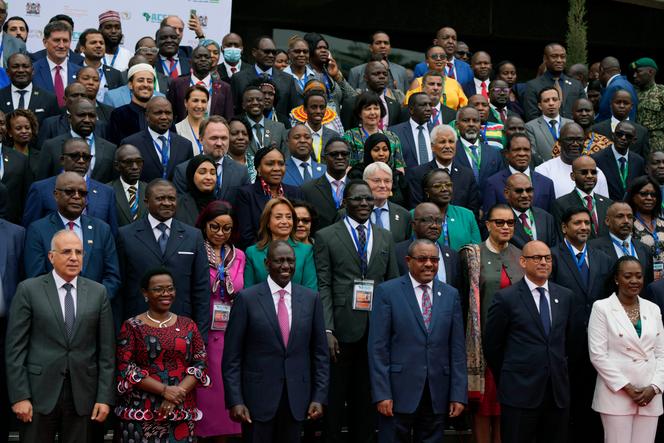


It was only supposed to be a briefing on the draft final declaration of the first African Climate Summit, in Nairobi, on Monday, September 4. However, the document prepared by Kenya and the Secretariat of the African Union (AU) was harshly criticized by environment ministers meeting behind closed doors during the evening, even though heads of State – who will be required to adopt the declaration – had arrived in the Kenyan capital a little earlier. The text is intended to define the shared position of the 54 countries of the African continent in climate negotiations, the next stage of which will take place in Dubai at the 28th Conference of the Parties to the United Nations Convention on Climate Change (COP28) in December.
While the summit was intended to demonstrate the continent's unity in the fight against climate change, Monday's meeting turned into a series of complaints, revealing substantial disagreements. Some ten countries took the floor, starting with the Comoros, which holds the rotating presidency of the African Union. "We had asked for the role of the oceans and the blue economy to be included in the text," said Houmed Msadie, minister of agriculture, fisheries, and the environment.
Botswana complained that the issue of adaptation to climate change, which is "central" to the survival of millions of Africans, had not been spelled out more clearly. Egypt called for the goal of doubling international funding for adaptation to climate change to be included in the text. Barbara Creecy, South Africa's environment minister, said her country would not support "the call for a new global tax regime to finance large-scale climate action." On this point, Nigeria also expressed reservations.
But it was Arlette Soudan-Nonault, the Republic of Congo's minister of the environment, who had the harshest words against a vaguely worded text that fails to define, in concrete terms, the continent's contribution and expectations of polluting countries. In particular, she pointed to the absence of any reference to the ecosystem services provided by the forests of the Congo Basin. "This is a text that commits the continent to COP28 and beyond. We cannot accept a declaration which, in certain passages, presents the situation in such a shocking way for Africans," she said. Zambia, which chairs the group of African negotiators, settled the matter in a manner familiar to COP aficionados: "There is no consensus."
At the podium, Kenyan Environment Minister Soipan Tuya and African Union Agriculture Commissioner Josefa Sacko took the criticism and provided assurances that the text would be reviewed to reflect the expectations of governments. The lack of transparency with which the declaration was drawn up opened the door to speculation. A first draft had been submitted in mid-August to a meeting of environment ministers in Addis Ababa for amendment.
Everyone was able to send their proposals to the AU secretariat. But that was as far as the exchanges went, and the ministers belatedly discovered in Nairobi a final version that fell far short of their expectations and the positions adopted to date. "There cannot be two African positions, the one written in Nairobi and those of our group of negotiators, warned the Ethiopian environment minister. Some, speaking on condition of anonymity, questioned the role played by McKinsey, to which Kenyan President William Ruto turned for the organization of the summit.

In an open letter to the Kenyan president published on the eve of the summit, several hundred civil society organizations made this accusation. Among their concerns was the firm's influence, accusing it of pushing "pro-Western interests to the detriment of Africa."
These organizations, which demonstrated in Nairobi on Monday, consider that the positive narrative of green growth promoted by Ruto does not give sufficient prominence to the issue of access to electricity, which 600 million people still lack, and to the adaptation of the most vulnerable populations. "Africa must not engage in false solutions. The continent is ravaged by climate disruption, and the carbon markets that the summit wants to promote will not serve climate justice," said Augustine Njamnshi of the Pan-African Climate Justice Alliance. Despite the outcome, Kenya has less than 24 hours to demonstrate that Africa can speak with one voice.
Translation of an original article published in French on lemonde.fr; the publisher may only be liable for the French version.
